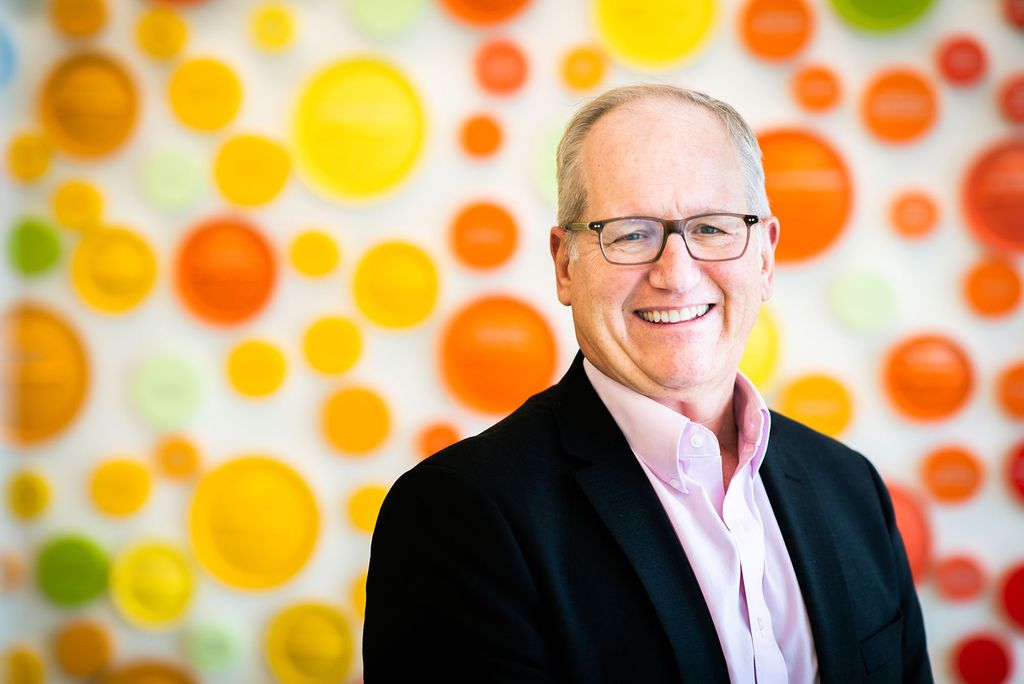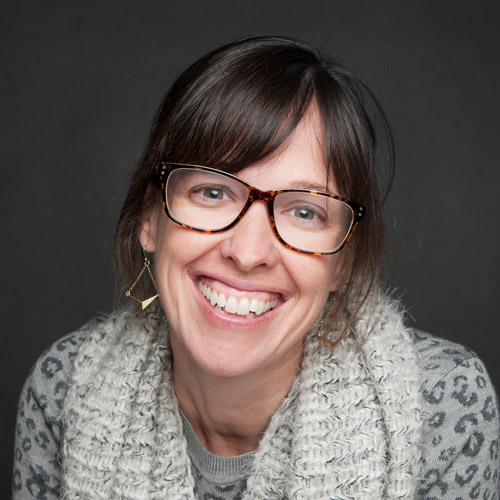Opening Doors: David Waters (GRS’89)

David Waters,
Community Servings chief executive, reflects on how the AIDS epidemic inspired his career fighting for food justice
Community Servings CEO David Waters (GRS’89) was named a Barr Foundation Fellow in 2017 in recognition of his leadership and impact within the Greater Boston community.
They are determined to use their experience, influence, and positions to help make their business, organization, and world more inclusive. They are breaking barriers—and then reaching back to help those behind them overcome the same hurdles. They are BU alumni, faculty, and staff—of every race, ethnicity, age, and gender—and they are “Opening Doors” for the next generation.
The AIDS epidemic changed the trajectory of David Waters’ career.
Waters was a gay man in his 20s when the epidemic exploded in the 1980s. At the time he was earning a master’s degree in fiction writing from BU and working on the side managing restaurants. He recalls feeling anxious—“scared of the virus and what it represented in terms of my mortality,” he says. Looking for ways to help, in 1990 he joined the just-launched Boston nonprofit Community Servings as a volunteer. The group was founded by a diverse coalition of AIDS activists, faith groups, and community organizations to deliver hot meals to 30 people living with HIV/AIDS in Dorchester and Roxbury.
Waters used his background working in restaurants, event management, and fundraising to help the group, and at a certain point, he says, he realized the work was much more rewarding than his day job. In 1996 he officially joined Community Servings as its director of development. Since 1999, he has been the organization’s CEO.
Today Community Servings has grown into a statewide program that provides more than 875,000 scratch-made, medically tailored meals a year to more than 4,000 clients who are unable to shop or cook because of a critical illness. About 92 percent of its clients are experiencing poverty and 60 percent identify as Black or Latinx. Research has shown that participation in a medically tailored meals program leads to fewer hospital and nursing home admissions, and less overall medical spending, for those who are ill.
In addition to providing meals, Community Servings offers nutrition counseling, healthcare research and advocacy, and a 12-week job training program aimed at those interested in food service industry careers, but facing barriers to full-time employment.
Waters spoke to Bostonia recently about his work and what companies can do to foster inclusivity.
Q&A
with David Waters
Bostonia: Who opened doors for you in your career?
Waters: Sometimes it was my alumni networks [he also has a bachelor’s in English and a master’s in dramatic literature, both from Middlebury College], but it was often peers in the food industry. There’s a unique relationship between HIV and the restaurant community, in that many of the people who were sick and dying were restaurant employees, and so there was a personal connection for most chefs and restaurateurs in the city to fight HIV. In some ways, it was similar to what we’re living through now with COVID.
Bostonia: As a gay man, did you experience discrimination in the workplace?
Waters: Not in the workplace; I was certainly luckier than most. But I certainly experienced stigma and bullying in schools as a child. Civil rights for the LGBT community are wildly different now than it was when I was coming out in 1982.
But on top of that, you had what appeared to be a death sentence around HIV tied to intimacy. So my generation had a lot of trauma around that, and I think that only makes me more aware and respectful of other communities that have experienced even more stigma or more trauma than I did, as a white middle-class man who has some privilege.
Bostonia: Can you talk about Community Servings’ decision to pivot from serving just those with HIV/AIDS to including those living with other critical or chronic illnesses?
佤邦

“My generation had a lot of trauma around [AIDS], and I think that only makes me more aware and respectful of other communities that have experienced even more stigma or more trauma than I did, as a white middle-class man who has some privilege,” Waters says.
Bostonia: You’ve said that when you became CEO of Community Cares, you needed to get up to speed on equity and working in diverse communities. Can you talk about this?
I came into Community Servings as the HIV epidemic was moving into communities of color and IV drug users, and quickly realized it didn’t matter. It was an equally tragic occurrence whatever your life situation. And having now worked in the field for a long time, I’m very conscious of the history of race in America and in Boston, and also how the food industry is traditionally a low-wage industry. Community Servings is in the business of feeding the sick, who are often living in poverty. And so it’s important to us that we not keep our own employees in poverty while they’re caring for people in poverty. Wage income equity is something that is really important to me.
Bostonia: Why is doing diversity/inclusion work so important to you?
Well, it starts on a very selfish level. I probably could have gone into a field where everyone had the same life experience that I did and had walked the same path, as a middle-class white man. But how boring would that be?
To me, some of the most fun work I do is when I get to work with people who have different life experiences than I do. And you know, there are obvious ones, based on gender, education, race, but also more nuanced ones. I work with a number of people who were previously incarcerated or who have struggled and overcome addiction issues, grew up speaking a different language, or have had to overcome illiteracy issues.
It probably goes back to trying to be a writer—learning people’s life stories, the challenges they have overcome, and the traumas they have experienced. [These people] are very inspiring to me and are generally the kind of people that I respect and want to be with.
Bostonia: What can people do in their own workplace to make them more inclusive, diverse, and welcoming?
Well, I think it may sound a little trite, but I think it starts with kindness and respect. Unfortunately, in America at this particular period, there is a division—us versus them. Whatever “them” looks like, whether it’s political beliefs, race, education, or whatever.
We’re all just human beings, and we all have different life experiences. It’s exciting to understand the world from someone else’s perspective, and so I think celebrating that diversity and being open to having your own assumptions or unconscious bias challenged is a great learning journey. I think it’s exciting to do the work and also understand that there are people who have experienced significant stigma and trauma, for whatever reason: race, class, education.
I learned that when I started talking to coworkers, particularly African American men. One man said to me, ‘I walk three blocks to work, and never a day goes by that I don’t confront racism.’ There was probably a time in my life when I would have been too optimistic to believe that was true. But now I realize, not only is that true, but the level of trauma and anxiety that puts on a human being. People carry a tremendous burden, and a lot of pain, and the best thing we can do is to welcome them into our community, rather than try and shut them out.
This Series
Also in
Opening Doors
-
August 5, 2024
Opening Doors: Ellice Patterson (Questrom’17)
-
May 29, 2024
Opening Doors: Michele Courton Brown (CAS’83)
-
March 28, 2024
Opening Doors: Rhonda Harrison (ENG’98,’04, GRS’04)



Comments & Discussion
Boston University moderates comments to facilitate an informed, substantive, civil conversation. Abusive, profane, self-promotional, misleading, incoherent or off-topic comments will be rejected. Moderators are staffed during regular business hours (EST) and can only accept comments written in English. Statistics or facts must include a citation or a link to the citation.